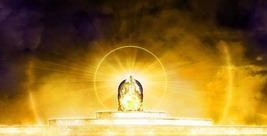

قال في تعليقه على صحيح الترغيب والترهيب ( 1 / 116 ) من طبعة المكتب الإسلامي الثانية 1406 هـ* ما نصه :فائدة هامة : اعلم أن قوله في هذا الحديث : فإن الله قبل وجهه .وفي الحديث الذي قبله فإن الله عز وجل بين أيديكم في صلاتكم لا ينافي كونه تعالى على عرشه ، فوق مخلوقاته كلها كما تواترت فيه نصوص الكتاب والسنة ، وآثار الصحابة والسلف الصالح رضي الله عنهم ، ورزقنا الاقتداء بهم ، فإنه تعالى مع ذلك واسع محيط بالعالم وقد أخبر أنه حيثما توجه العبد فإنه مستقبل وجه الله عزوجل ، بل هذا شأن مخلوقه المحيط بما دونه ، فإن كل خط يخرج من المركز إلى المحيط ، فإنه يستقبل وجه المحيط ويواجهه .وإذا كان عالي المخلوقات يستقبل سافلها المحاط بها بوجهه من جميع الجهات والجوانب ، فكيف بشأن من هو بكل شئ محيط ، وهو محيط ولا يحاط به ؟ وراجع بسط هذا في كتب شيخ الإسلام ابن تيمية كالحموية والواسطية وشرحها للشيخ = ( * ) زيد بن عبد العزيز بن فياض ( ص 203 - 213 )
-
He said in his footnotes on Sahih at-Targhib wat-tarhib, from the 1406 Hijri edition of al-Maktab al-Islami ath-thani
'Important (point of) benefit: know that his statement in this hadith, 'Allah is in front of his face,' and in the previous hadith, 'Allah Azza wa jalla is in front of you during your Salat,' does not negate His being on/above the throne (and) above all of his creations, as the text of the Qur'an and the Sunnah, and the reports of the Companions and Pious Predecessors report by tawatur (may Allah be pleased with them and may He grant that we follow them). Despite that, Allah is expansive and encompasses the world, and has informed us that wherever the slave faces, he is facing the Face of Allah (azza wa jalla).
This is something similar to what was mentioned by the pseudo-Salafi theologian 'Shaykh'Haitham Hamdan who is an administrator of the Multaqa Ahl al-Hadeeth forum: Quote:
2) The universe is round (sperical).
3) Relative to itself, a sperical shape can only have two directions: a top and a bottom.
4) For a sperical shape, bottom is towards its center, above is away from its center.
5) Allah SWT is certainly away from the center of the world, so He is certainly above it.



9- ثم ذكر الصابوني - هداه الله - تنزيه الله سبحانه عن الجسم والحدقة والصماخ
واللسان والحنجرة ، وهذا ليس بمذهب أهل السنة بل هو من أقوال أهل الكلام
المذموم وتكلفهم ، فإن أهل السنة لا ينفون عن الله إلا ما نفاه عن نفسه أو
نفاه رسوله صلى الله عليه وسلم ولا يثبتون له إلا ما أثبته لنفسه أو أثبته له
رسوله صلى الله عليه وسلم ولم يرد في النصوص نفي هذه الأمور ولا إثباتها
فالواجب الكف عنها وعدم التعرض لها لا بنفي ولا إثبات ، ويغني عن ذلك قول
أهل السنة في إثبات صفات الله وأسمائه أنه لا يشابه فيها خلقه وأنه سبحانه لا
ند له ولا كفو له. قال الإمام أحمد رحمه الله: (لا يوصف الله إلا بما وصف به نفسه
أو وصفه به رسوله صلى الله عليه وسلم لا يتجاوز القرآن والحديث).
-
9_ Then As-Sabuni –May Allah guide him- mentioned declaring Allah transcendent beyond possessing body (al-jism), pupils (al-hadaqa), auditory meatus (al-simâkh), tongue (al-lisân), and larynx (al-hanjara); [End of Sabuni's words- beginning of Ibn Baz's words] and this is not the position of Ahl al-Sunna but rather that of the scholars of condemned kalâm and their contrivance , for Ahl As-sunnah do not negate something about Allah except what He negates about Hisself or what his Messenger صلى الله عليه وسلم negated, and they do not affirm for Him (Allah) except what He affirmed for Hisself or what the Messenger of Allah صلى الله عليه وسلم affirmed for Him, and it was not mentioned in the nusoos (the Quran and Sunnah) negation of these things (that As-Sabuni mentioned) or its affirmation; so it is obligatory to stop there and not to confront it with neither negation or affirmation, and what Ahl As-sunnah said suffices in the affirmation of Allah's attributes and names that He does resemble in it his creation, and that He (glorified be He) has no match. Imam Ahmad [rahimahu Allah] said: "Allah is not to be described except with what He described Himself with or what His Messenger described Him with, it does not exceed the Quran and Hadith".
---------------------
Similarly the Salafi/Wahhabi editor of "I'itiqad A'immat Al-Hadith", a book attributed to Al-Hafidh Abu Bakr Al-Isma'ili (d. 371 H.)
In his explanatory footnote the editor said, as translated Here and posted on the 'Salafi' Multaqa Ahl al-Hadeeth forum: Quote:

'Shaykh' Ibn Baz says:
مسألة في الصفات
في حديث السبعة الذين يظلهم الله في ظله يوم لا ظل إلا ظله، فهل يوصف الله تعالى بأن له ظلاً؟
نعم كما جاء في الحديث، وفي بعض الروايات: ((في ظل عرشه))[1] لكن الصحيحين ((في ظله))، فهو له ظل يليق به سبحانه لا نعلم كيفيته مثل سائر الصفات، الباب واحد عند أهل السنة والجماعة. والله ولي التوفيق.
---
[1] أخرجه البخاري في كتاب الأذان، باب من جلس في المسجد ينتظر الصلاة، برقم 660، ومسلم في كتاب الزكاة، باب فضل إخفاء الصدقة، برقم 1031.مجموع فتاوى ومقالات متنوعة المجلد الثامن والعشرون
---
In the hadith of the seven of those who will be shaded by Allah in His shadow on the day that there is no shadow save His shadow, is this attributing Allah the Exalted with a shadow?
Yes, as is reported in the Hadith and in some transmissions : "in the shadow of His throne". But, in the Sahihayn it is : "in His shadow" for He has a shadow that is befitting to Him, the Glorious, and we do not know its modality (Kayf) just like the rest of His attributes...
Note:

Says 'shaykh' Ibn Baz on his 'commentary' on al-`Aqida al-Tahawiyya:
So that which is a "thing" must necessarily be described with attributes. Nothingness is described with no limit or restriction. Your statement: He has no limit means that He is nothing.
Abu Sa'id said: Allah Ta'ala has a limit that no one knows but Him and it is not allowed for anyone to imagine a limit to His limit in himself, however, he is to believe in the limit and relegate the knowledge of that to Allah. His place (Makan) also has a limit and He is upon His 'Arsh above the seven heavens- so these are two limits.

In the same source and footnote cited above of 'shaykh' Ibn Baz on his 'commentary' on al-`Aqida al-Tahawiyya we find:
"...He is High, in the direction of upwards, over the creation".
"He is beyond having limits placed on Him, or being restricted, or having parts or limbs. Nor is He contained by the six directions as all created things are."
The pseudo-salafi 'shaykh' محمد بن مانع / Muhammad ibn Mani' states as quoted in this commentary on al-`Aqida al-Tahawiyya, Sharh wa Ta`liq - fn 6:

In Fatawa al-Aqida Pseudo-Salafi 'shaykh'
Muhammad b. Salih b. Uthaimin,
page 112, is quoted saying:
وأي مانع يمنع من أن نؤمن بأن الله تعالى يأتي هرولة
-
And this is from the Lajnatud-Da'imah lil-Buhuthul `Ilmiyyah wal-Ifta / The Permanent Committee for Scholarly Research and Fatawa (Kingdom of Saudi Arabia):
Quote:
فتاوى اللجنة الدائمة للبحوث العلمية والإفتاء ج3ص196 :
( س : هل لله صفة الهرولة ؟
ج : نعم ، على نحو ما جاء في الحديث القدسي الشريف على ما يليق به قال تعالى : إذا تقرب إليّ العبد شبرا تقربت إليه ذراعا وإذا تقرب إليّ ذراعا تقربت منه باعاً وإذا أتاني ماشياً أتيته هرولة . رواه البخاري وسلم ).
-
Q: Is Jogging (Harwala) an attribute of Allah?
A: Yes, as it has been shown in the Hadith Qudsi al-Shareef ..... "... and if he comes to Me walking, I go to him running." Narrated by al-Bukhari and Muslim.


Note:
The pseudo salafi theologian Salih b. Fawzan al-Fawzan (rightly) negates what the Lajna' say is an 'attribute' of Allah:
الهرولة ليست بصفة لله) العلامة صالح بن فوزان الفوزان -حفظه الله) -
Quote: “If My slave comes to Me walking, I go to him running”. Sahih Al-Bukhari, vol. 9, Book 93, Number 627
Ibn Baz cites the hadith in his Fatawa and adds:
“Interpreting such hadith metaphorically and avoiding relying upon their literal meanings is the practice of the heretic Jahmiyyah and Mu’taziliyyah”. Fatawa Ibn Baz, vol. 5, p. 374
Al-Albani is
very explicit on the
point: “Running is
an attribute of Allah that we
lack a base for denying”. Fatawa Al-Albani, p.
506
Again, Ibn Baz adds: Question: Is
running an attribute of Allah? Answer: Yes, as
it has been shown in the holy divine hadith....."and if he comes
to Me walking, I go to him running. narrated bukhari and muslim.
Ibn Baaz, The Everlasting Garden for Scientific Research and Legal Opinions Vol.3 Page 196. The heading of the subject where this fatwa was issued is called "Sifat al-harwala" , the attribute (Sifa) of running.
The fatwa issued here is number 6932 Book title: Fatawa al-Janna al-Da'ima Lilbuhuth al'ilmiyah wa al'ifta. Author: Ahmed bin Abd Alrazaq al Dewish Published in Riyadh by the Ministry of Scientific Research and Fatwa Management. Date: 1996 Description: A collection of fatwas by various prominent scholars. In Fatawa al-Aqida by ibn Uthaimin, page 112: “What could forbid us from believing that Allah performs jogging?”
---
Says 'Shaykh' Ibn Uthaimeen:
We know the meaning of istawa and we believe it and accept/approve it and He subhanahu wa ta'ala is upon is His arsh and His establishment thereupon is of aboveness andsettledness(istiqrar) Glorified and Exalted be He. We don't know the howness of this al-istawa'.
Says Pseudo Salafi 'Shaykh' al-Uthaimeen in Majmu Fatawa (vol. 1, no. 57) quoting Ibn al-Qayyim [provided by sh. Abul Hasan]:
with respect to the sitting, Ibn al-Qayyim has reported in As-Sawaaiq 1303/4 from Kharijah bin Mus'ab with respect to the saying of Allah the Exalted :The ayah: Ar-Rahmanu Alal Arshi Istawa, "How can the ascension be anything other than sitting?" and the mention of sitting has been reported in the Hadeeth from Imam Ahmad from Ibn Abbas, may Allah be pleased with them both, in a Marfu' fashion. And Allah Knows best

Similar statements are found in the book Kitab al-sunna attributed to `Abd Allah ibn Ahmad ibn Hanbal (d. 290) by the pseudo-salafis, but whose stand in relation to the Sunna and anthropomorphism can be judged by the following excerpt:
10 حدثني أحمد بن سعيد أبو جعفر الدارمي قال سمعتُ أبي يقول سمعت خارجة يقول الجهمية كفار بلغوا نساءهم أنهن طوالق وأنهن لا يحللن لازواجهن لا تعودوا مرضاهم ولا تشهدوا جنائزهم ثم تلا : ﴿طه * مَا أَنزَلْنَا عَلَيْكَ الْقُرْآنَ لِتَشْقَى * إِلاَّ تَذْكِرَةً لِّمَن يَخْشَى * تَنزِيلاً مِّمَّنْ خَلَقَ الأَرْضَ وَالسَّمَاوَاتِ الْعُلَى * الرَّحْمَنُ عَلَى الْعَرْشِ اسْتَوَى﴾ ، وهل يكون الاستواء الا بجلوس.
page 5, Kitab al-sunna (Cairo: al-Matba`a al-Salafiya, 1349/1930).


The contemporary salafi preacher Dr. Aidh al-Qarni also describes Allah as 'sitting' on His throne as can be seen in a recording of one of his khutbas. [edit: video now removed]
And finally, in his Tafsir named "an-Nahrul-Madd", the Grammarian Abu Hayyan al-'Andalusi reported about Ibn Taymiyah:

Pseudo salafi theologian 'shaykh' al-`Uthaymin says:
وهذا الملل الذي يفهم من ظاهر الحديث أن الله يتصف به ، ليس كمللنا نحن ، لأن مللنا نحن ملل تعب وكسل ، وأما ملل الله عز وجل فإنه صفة يختص به جل وعلا ، والله سبحانه وتعالى لا يلحقه تعب ولا يلحقه كسل ، قال تعالى : ( وَلَقَدْ خَلَقْنَا السَّمَاوَاتِ وَالْأَرْضَ وَمَا بَيْنَهُمَا فِي سِتَّةِ أَيَّامٍ وَمَا مَسَّنَا مِنْ لُغُوبٍ ) (قّ:38) هذه السماوات العظيمة والأرض وما بينهما خلقها الله تعالى في ستة أيام : الأحد والاثنين والثلاثاء والأربعاء والخميس والجمعة ، قال (وَمَا مَسَّنَا مِنْ لُغُوبٍ ) يعني ما تعبنا بخلقها في هذه المدة الوجيزة مع عظمها
-
---
Abd Allah al-Hashidi the "Salafi" editor of al-Bayhaqi's al-Asma' wal-Sifat (2:60) openly attributes form and shape to Allah Most High:
كان رحمه الله سلفي المعتقد، شديدًا في الحقّ، قويّ الحجّة والبيان، أفنى حياته في التعليم والتأليف ونشر السنة وعقيدة أهل السنة والجماعة
and says on p. 39 of his commentary on "At-Tawhid" by Ibn Khuzayma:
"So 'Image / form' is not attributed to Allah the way his creation is attributed to Him, because it (His image / form), is an attribute which subsists in His essence"
"Then he appeared to us with an image/form which is different then what we have previously seen, and He returned to us in the image/form we first saw him in and says: 'I am your Lord' "
Note:
Salafi theologian Sulaiman al-Alwan is quoted on the Ahl al-Hadeeth forum calling out the pseudo salafis' own major reference in `Aqida Ibn Khuzayma, author of the book Kitab al-Tawhid (which was renamed Kitab al-Shirk by Fakhr al-Razi), for his supposed negation of 'image / form' as an attribute of God stating:
وأما تأويل ابن خزيمة-رحمه الله تعالى- لحديث ((خلق الله آدم على صورته)) فإنه خلاف الحق ، وهو معدود من أخطائه، والله يعفو عنه ، ولا يجوز لنا التشبث بأخطاء العلماء وزلاتهم ، فإن تتبع زلات العلماء من هوادم الإسلام
Translation: As for Ibn Khuzayma's interpretation (taw'il) of the hadith, 'Allah created Adam upon his image,' it stands contrary to the truth, and is to be counted among his errors, may Allah pardon him. It is not permissible for us to adhere to the errors and slips of the scholars, for following the slips of scholars is one of the things that tears down the edifice of Islam.

The author also objects to declaring:
The book that this quote was taken from, was reviewed, edited and checked by some senior Salafi scholars like:


ج: نعم كما وصفه الرسول -عليه الصلاة والسلام- لكن هذا التردد ليس كتردد المخلوق الذي يدل على الضعف، ولكنه تعارض الإرادتين كما بين في الحديث، فالله تعالى يريد ما يريده عبده المؤمن، والمؤمن يكره الموت، فالله يريد ما يريده عبده المؤمن، ولكن الله قضى وقدر أنه يموت، فهذا تعارض إرادتين إرادة الموت؛ لأن الله قدره، وإرادة ما يريده العبد وهو كراهة الموت ولا ينافي هذا التردد ترجيح إحدى الإرادتين؛ لأن الموت لا بد منه نعم.
---
Answer (tr. Um Abdullah / NMS/ Musleemah): Yes, as the Messenger -Alayhi As-Salatu Wa-Salam- described Him, but this taraddud (hesitation) isn't like the hesitation of creation that indicates weakness, but it is a conflict between two wills as the hadith explains. Allah Ta'ala wants what the believing slave wants, and the believer does not like death, so Allah wants what His believing slave wants, but Allah Has decreed that He die, so this is a conflict between two wills, the will for him to die, because Allah decreed it, and the will of what the slave wants, which is hating death, and this hesitation does not go against the outweighting of one will over the other, because death is a must.
Pseudo Salafi theologian 'shaykh' 'Alawi al-Saqqaf said:
قال الشيخ الفاضل علوي السقاف في " صفات الله عز وجل " ( ص 177 ) : يوصف ربنا عَزَّ وجَلَّ بالسُّكوت كما يليق به سبحانه ، )لَيْسَ كَمِثْلِهِ شَيْءٌ وَهُوَ السَّمِيعُ البَصِيرُ(.وهذا ثابتٌ بالسنة الصحيحة ، وهي صفةٌ فعليَّةٌ اختيارية متعلقة بمشيئته سبحانه وتعالى
-
There is a book called Al Tabsir Fi Ma'aalim Al Deen which the salafis say is by Imam al-Tabari. In there is a related quote which the Salafi editor (a prominent Salafi theologian) Dr. Ali ibn Abd al-Aziz al-Shibl objected to:

The salafi editor of this work writes that this position is similar to “what the Asharis say regarding Kalam Nafsi” and continues to rejects Imam Tabari's words saying, “It is not allowed to negate silence (sukut).....”


al-Ghunayman:
قوله: (( حتى يضحك الله منه )) صفة الضحك تكاثرت عليها الأدلة، وهي صفة من صفات الفعل، يجب الإيمان بها على ظاهر ما دلت عليه النصوص، ولا يجوز تأويل الضحك بلازمه، كما يقوله أهل الباطل، من الجهمية ومن سار على نهجهم، من أن الضحك هو الرضا أوالعطا، ونحو ذلك مما هو من مخلوقات الله – تعالى -.قال أبو سعيد الدرامي – رحمه الله -: [ وادعى المعارض أن ضحك الرب: رضاه ورحمته، وصفحه عن الذنوب، كقولك: رأيت زرعاً يضحك.فيقال له: كذبت بأحاديث رسول الله – صلى الله عليه وسلم الله عليه وسلم – إذ شبهت ضحكه بضحك الزرع؛
....ولم نسمع عن أحد من أهل السنة أنه يشبه ضحك الله – تعالى – أو شيئاً من أفعاله بشيء من فعل المخلوقين، كما
ادعيت أيها المعارض.
بل نقول: إن الله – تعالى – يضحك كما يشاء، وكما يليق به.
--
Abu Saed al-Darami said - May Allah Have Mercy on him -: [and it was claimed by the opposition that the God's laugh: is his satisfaction and mercy, and forgiveness of the sins, like you said: I saw/found seed in a laugh.
It was said to him: You lied about the narrations of Allah's prophet - - as you likened his laugh with the seed's laugh,
And we didn't hear from anyone from Ahlul Sunnah likening Allah - Almighty's - laugh or any of his acts with any of the creatures acts. like you claimed, o opposer.
We say: that Allah - Almighty - Laughs as He Wants, and as fits Him.”
The view about the feet and hands is the same, and there is no room for differentiation.” End quote from (Sharh al-Waasitah, p. 172 )Here
Astaghfirullah!
Note:
---
















